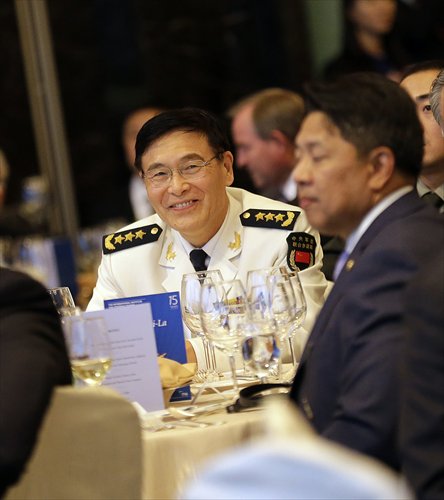HOME >> CHINA
China to explain sea issues at forum
By Guo Yuandan and Sun Xiaobo in Singapore and Liu Xin in Beijing Source:Global Times Published: 2016-6-4 1:36:46
Admiral Sun says delegation will not indulge in wrangling

Admiral Sun Jianguo, deputy chief of the General Staff of the Chinese People's Liberation Army, listens to the keynote address during the Opening Dinner of the 15th Shangri-La Dialogue on Friday in Singapore. Photo: IC
As Asia's largest annual security forum kicked off in Singapore Friday, the Chinese delegation insisted it would not indulge in wrangling with other nations amid speculation that the South China Sea issue would dominate the discussions.The Chinese delegation is not attending the Shangri-La Dialogue to wrangle with others or merely discuss the South China Sea issue, but to explain China's policies and moves, Sun Jianguo, deputy chief of the General Staff of the Chinese People's Liberation Army and head of the Chinese delegation, told the Global Times Friday.
Sun will make a keynote speech on Sunday in which he said he would argue on just grounds and convince people by reasoning.
Defense ministers and military chiefs and officials from around 30 countries attended the 15th Shangri-La Dialogue on Friday. The conference ends Sunday after a series of open and closed-door conversations.
US Defense Secretary Ashton Carter and defense ministers from India, Japan, New Zealand and other Asia-Pacific countries are also expected to take part.
"It's possible the South China Sea will dominate discussions during the summit since it has become a major factor affecting regional peace and stability with the involvement of the US and other non-claimants," Chen Xiangmiao, a research fellow at the National Institute for the South China Sea, told the Global Times on Friday.
The Shangri-La Dialogue will be a better platform for China to explain the historical facts of its sovereignty in the South China Sea and clarify its position to the international community, especially as the arbitration court in The Hague is going to hand down its verdict on the Philippines' instigated proceedings soon, said Chen.
During a bilateral meeting with Indonesian Defense Minister Ryamizard Ryacudu on Friday, Sun expounded on China's consistent position on the South China Sea issue and Ryamizard said related countries should make joint efforts to maintain regional security.
Sun also met separately with Vietnam's Deputy Defense Minister Nguyen Chi Yong and New Zealand Defense Minister Gerry Brownless in bilateral meetings ahead of the forum, according to the Xinhua News Agency.
Excuses, meddling
"The US uses 'freedom of navigation' as an excuse and meddles in the South China Sea issue to build and maintain alliances in the Asia-Pacific region," said Chen, adding that the US moves have complicated the issue and increased the potential of military conflicts in the region.
Ahead of his departure to Singapore for the summit, Carter spoke forcefully about China's military moves in the South China Sea and said that Beijing risked building a "Great Wall of self-isolation" in a speech at the US Naval Academy last week, AFP reported.
Michael Pillsbury, consultant to the Office of the US Secretary of Defense, told the Global Times that Carter will deliver a keynote speech in a way similar to that of recent speeches, in which he would not warn China but convey his ideas clearly that China as a power has its responsibilities and should not act rashly.
China hopes that the US, which is not a claimant in the South China Sea disputes, will keep its promise not to take sides on issues involving territorial sovereignty and to make judgments in accordance with facts rather than favoring its allies, Zheng Zeguang, China's vice foreign minister, said on Thursday at a forum ahead of a high-level meeting with US officials in Beijing.
Zheng said that China is committed to maintaining peace and stability in the South China Sea, and is making continuous efforts to control differences through dialogue and solve problems peacefully through negotiation and consultation.
As he delivered his keynote speech at the Opening Dinner, Thai Prime Minister Prayut Chan-o-cha mentioned the tensions in the South and East China Seas. He noted that ASEAN nations should be united over the issue and disputes should be resolved in accordance with international laws.
THAAD security concerns
Aside from the South China Sea issue, Carter is expected to address the deployment of the US Terminal High Altitude Area Defense (THAAD) missile system to South Korea, AFP reported.
Carter told media en route to the dialogue on Thursday that "this is an alliance decision" about self-defense.
China strongly opposes the move since the detection zone goes far beyond the Korean Peninsula and could affect China's strategic security, said Sun, adding that China resolutely objects to any country's attempt to harm China's interest on the Korean Peninsula nuclear issue.
The South Korean defense ministry denied the US media reports, saying that there is no plan to discuss the THAAD deployment during the South Korea-US defense chiefs' talks in Singapore, according to South Korea's Yonhap news agency on Friday.
Several key topics such as the denuclearization of the Korean Peninsula, anti-terrorism and security challenges in Asia are likely to dominate the discussions, Xinhua reported.
Posted in: Diplomacy